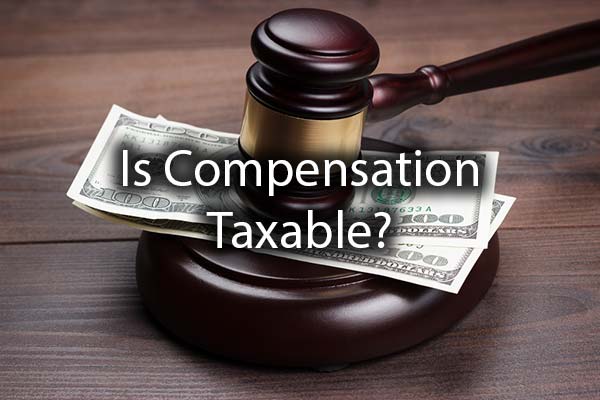
After dropping her kids off at school, a single mother of two went to the store to do some much-needed shopping. This was her only day off, and she was eager to make the most of it before resuming the tireless task of juggling children and daily responsibilities. Her plans were derailed, however, when she was involved in a rear-end collision.
Thankfully, she was able to walk away from the accident with minor injuries, but her car was totaled. Her friends and family members all urged her to seek compensation for the damages and medical expenses caused by the accident, but she was hesitant. She had two kids to think about and only made enough money to get them by. If the compensation she received from pursuing a claim was taxable, she feared she couldn’t cover the cost of those taxes. Because of this, she decided not to press a claim and faced the road to recovery with zero aid.
Unfortunately, stories like this are all too common. The fear surrounding taxes leaves many victims passing on the opportunity to seek compensation after their accident. To help quell those fears, our expert attorneys at the Hernandez Law Group, P.C. have written this article to answer the question, “Is my compensation taxable in Texas?”
Types of Compensation in a Personal Injury Case

To understand the laws surrounding compensation taxes, you must know the types of compensation awarded in successful personal injury cases. Compensation can be broken down into three different categories:
- Economic damages
- Non-economic damages
- Punitive damages
Economic Damages
Also known as financial hardship damages, this type of compensation covers the injured party’s out-of-pocket expenses. This includes both already-paid and future expenses. These damages include the following:
- Medical expenses
- Loss of wages
- Loss of future earning capacity
- Damages to personal property
Non-Economic Damages
Non-economic damages include emotional or physical pain that the injured party suffered or continues to suffer due to the injuries resulting from the accident. Non-economic damages are as follows:
- Physical pain
- Emotional distress
- Mental anguish
Punitive Damages
Punitive damages are awarded when the injured party’s injuries result from the liable party’s intentionally reckless actions. These damages serve as a deterrent for others who may engage in similar behavior. Punitive damages are not awarded in every personal injury case. They are typically used to punish the defendant for their actions.
Understanding Tax Laws for Personal Injury Compensation in Texas

Texas does not have a state income tax and, therefore, does not tax compensation gained through a personal injury lawsuit or settlement. However, federal tax laws still apply.
Personal Injury Settlements and Federal Tax Laws
The IRS has specific guidelines determining which types of compensation for personal injury lawsuits are taxable. These guidelines clearly state that the following damages are not taxable, as they are meant to cover medical expenses and personal property damages:
- Lost wages
- Medical expenses
- Emotional distress linked to the physical injury caused by the accident
- Pain and suffering
- Loss of consortium
- Attorney fees
However, some areas of compensation are taxable under federal law. These include the following:
- Punitive damages
- Interest on settlements (this occurs when interest is accumulated due to delayed payments).
- Emotional distress that is not linked to the injury caused by the accident
If part of the personal injury settlement you receive is taxable, the IRS will issue you Form 1099 so you can report it.
Consulting a Dallas Personal Injury Lawyer for Tax Advice
Handling potential taxes on a settlement can be overwhelming, especially when you are unsure what steps to take. It is extremely important to speak with a personal injury attorney before you accept any settlement outside of court. An experienced attorney can help you structure the settlement to reduce your tax liability. For example, by spreading out payments for taxable payments, such as punitive damages, you may reduce the taxes you have to pay in a single year.
Another reason to consult a personal injury attorney is to keep the documentation related to your settlement in order. This will help you correctly file any IRS forms, such as the Form 1099.
Dallas’s Trusted Personal Injury Attorneys: We Will Fight for You

The attorneys at the Hernandez Law Group, P.C. is dedicated to fighting for your compensation. We will walk you through the entire personal injury claim process, helping you get the most out of your settlement. We know that the accident that led to your injuries was traumatic enough, which is why we go to great lengths to take care of your case so you can focus on your recovery. With a no-win, no-fee agreement, our team removes the risk of seeking compensation for your accident. Contact our attorneys today to schedule a free, no-obligation consultation.
Personal Injury Settlement FAQs:
Most damages awarded during a personal injury lawsuit are protected under federal and state law and will not be taxed. However, some damages, such as punitive damages, are taxable under federal law. There is no way to avoid paying these taxes, and any attempts to do so could lead to legal trouble.
No. All current, future, and already-paid medical expenses accrued due to your accident are protected from being taxed by federal law.
The IRS protects an individual’s rights to fair compensation for personal injury lawsuits by ensuring that the following damages are not taxable.
– Lost wages
– Medical expenses
– Emotional distress linked to the physical injury caused by the accident
– Pain and suffering
– Loss of consortium
– Attorney fees
However, damages for emotional distress and punitive damages are taxable, as they do not directly go towards covering medical expenses or personal property damage repair/replacement.
